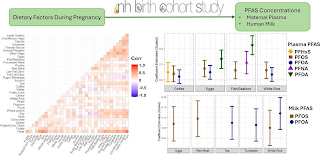UPDATE: Associations, specifically just associations, so no direct proof yet... so is this in the US or Japan or what? OK, they are US... all from New Hampshire.
"Since 2009, >3000 participants from New Hampshire have been enrolled in the NHBCS during their prenatal care visits. The eligibility criteria include 18–45 years old, English speaking and literate, single gestation".
Worth note: Previous studies conducted in European and Asian countries have suggested that food is a major source of human PFAS exposure (Domingo and Nadal, 2017; Haug et al., 2011; Sunderland et al., 2019). However, far fewer studies have investigated potential dietary sources of PFAS among U.S. populations, and this has been especially understudied during pregnancy, when
and
Among participants enrolled from prenatal clinics in rural New Hampshire, we aimed to 1) examine associations of dietary factors during pregnancy with PFAS concentrations in maternal plasma; 2) examine associations of dietary factors during pregnancy with PFAS concentrations in human milk.
and
most participants were non-Hispanic White persons (94.6 %) and had a college degree or above (72.9 %) (Table 1)
In conclusion, in this rural U.S. population we found that higher consumption of fish/seafood, eggs, coffee, and white rice during pregnancy was associated with higher plasma PFAS or milk PFOS and PFOA concentrations.
PFAS = polyfluoroalkyl substances = (PFAS)
Coffee, Eggs and White Rice Linked To Higher Levels of PFAS in Human Body ... Study that researchers say highlights chemicals’ ubiquity also shows PFAS association with seafood and red meat. My comment -> WTF. Associations but, damn. Tea, seafood, fruit... what the shit, it is in everything.
--
"In recent decades, PFAS exposure has been linked to a growing list of problems, including immune system suppression, lower birth weight, and increased risk for some cancers. This raises alarms about the use of these compounds, especially in items such as burger wrappers and salad bowls."The researchers administered the [BPA] dosage considered safe by America's FDA to about 20 individuals — and discovered they became less responsive to insulin after 4 days. The article includes this warning from the researchers....
Water bottle brands without BPA:
Feb 1, 2024Many water bottle brands have begun offering BPA-free options. This includes Dasani, Fiji, JUST, Evian, Perrier, Core, LIFEWTR, Nestle Pure, Poland Spring, and Essentia, among the most popular BPA-free water bottle brands. ... What Does BPA-Free Water Mean? BPA (short for Bisphenol A....


No comments:
Post a Comment